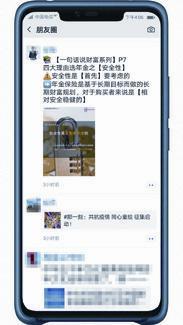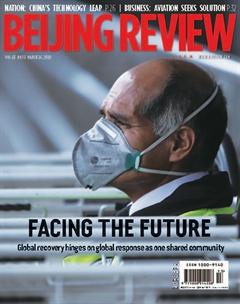Breakout After Outbreak
By Wang Jun

Usually, the fi rst three months of the year are the high season for the insurance industry. But this year, because of the novel coronavirus disease (COVID-19) outbreak, most insurance firms meetings with their clients have been canceled.
“Ive been selling products via WeChat or on the phone, and most of the policies sold now are short-term products,” Wang Shuo, an insurance agent, told Financial News.
On February 3, when Chinas financial industry resumed work, the China Banking and Insurance Regulatory Commission (CBIRC) issued a guideline for insurance agents. It prohibited agents from gatherings and group visits and insurance companies from holding group activities such as meetings and trainings to minimize the possibility of virus transmissions through this industry.
Wang said without face-to-face communications with clients, he cant gauge their demands accurately, especially those of potential clients with weak awareness of insurance.“The core advantage of insurance agents lies in continuous offline interactions with clients. Without face-to-face sales, the insurance business will face great challenges in its development,” he said.
Impact on industry
According to a research report released by China Securities on January 31, agent teams are the major sales channel of life insurance. Suspension of their offl ine operations means activities such as face-to-face sales, feedback visits, suitable product recommendations and contract signings will be limited. In addition, large promotions by insurance companies have to be postponed or canceled, and sales agents have to reduce people-to-people contacts for safety concerns, both of which will affect individual agents sales.
The ZhongAn Fintech Research Institute, the research arm of Internet-based insurance company ZhongAn that studies commercialization and application of advanced technologies, predicted in its report released on March 4 that in the fi rst quarter of 2020, the expansion of agent teams in various insurance companies will slow down. This is because traditionally, the recruitment of agents is done mainly through meetings, interviews and training, which need to be supported by offl ine operations.
The property insurance business will be seriously affected in the short term. Specifi cally, growth of premium income from car insurance will face some pressure due to limited new car sales. Sales of aviation accident insurance and traffi c accident insurance will decrease due to the massive cancellation of travel plans, the report said.
According to it, during the epidemic, except for one company that saw growth in its premium income in early and mid-February, all the other top 10 property insurance fi rms in China suffered signifi cant declines in business.
Health cover to rise
“After every disaster, people are inevitably more keen to buy insurance. Health-related insurance is expected to see a new round of breakout after this epidemic,” Wang Xujin, head of the Insurance Research Center of Beijing Technology and Business University, was quoted as saying by China Economic Times.
The ZhongAn report also said the epidemic will make the public more aware of health management and safeguarding against risks, which will greatly boost the breakout of health insurance in the short term and its development in the long run.
According to Wang Xujin, three reasons will lead to the rapid growth of health insurance after the epidemic.
It will increase peoples awareness of their health and risks and risk awareness is the most important reason for people to buy insurance.
Also, as peoples incomes grow, how to live with dignity becomes a common need. Insurance, especially health insurance, is an important guarantee of that.
The epidemic will also further educate the public in the importance of commercial insurance, especially health insurance, as a supplement to social security.

The China Securities report pointed out how health insurance grew explosively after the severe acute respiratory syndrome outbreak in 2003. During the May-August period that year, when the outbreak had come under control, health insurance premium soared by 309 percent, 265 percent, 158 percent and 131 percent in the four months respectively year on year, and then went back to the normal state after the epidemic situation further stabilized.
“As a risk management industry, the insurance industry is a stabilizer of social development and booster of economic growth,”Wang said.
The CBIRC fi gures showed that in 2019, the premium income earned by the Chinese insurance industry totaled 4.26 trillion yuan ($608.57 billion), a year-on-year increase of 12.17 percent.
Of this, property insurance generated a premium income of 1.16 trillion yuan ($165.71 billion) while life insurance earned 3.1 trillion yuan ($442.86 billion), up by 8.16 percent and 13.76 percent, year on year, respectively. In life insurance, health insurance generated a premium income of 706.6 billion yuan ($100.83 billion), surging 29.7 percent.
Transformation needed
“The epidemic will accelerate the insurance industrys transformation and upgrading. Offl ine sales have been affected, bringing pressure for increasing new policies and recruiting insurance agents and insurance companies will have to accelerate information technology application. This will be conducive to the sound and sustainable development of the industry,” Zhou Yanli, former Vice Chairman of the China Insurance Regulatory Commission, said in an article in China Banking and Insurance News.
According to the ZhongAn report, the COVID-19 outbreak is a kind of new opportunity for the development of the insurance industry. Because of the epidemic, insurance companies have widely recognized the importance and urgency of digital transformation. Highly efficient online sales channel will be one of the key points in the future market competition.
“This epidemic will accelerate the establishment of online insurance sales channels, and information technology-based insurance product innovation will also speed up. Under the mobile and digital trends, insurance companies will increase investment in insurance technologies, which will bring more vigor and impetus to the industry,” the report said.
According to Wang Shuo, his company is now holding meetings and trainings via the Internet, and his colleagues share information and conduct business exchanges via WeChat or e-mail.
“Through the online insurance system, our clients can process, anytime and anywhere, businesses such as automatic claim settlement and policy inquiry, and we can also make feedback visits through this system. The contactless operation model is really effi cient, and it can be used even after the epidemic is over,” he said.
Wang Guojun, a professor with the University of International Business and Economics in Beijing, told Financial News that during the epidemic, the insurance industry has been relying more on technology and focusing more on online sales, which is in line with the trend of sales channel revolution.
Online consumers, especially young people, are very capable of accessing Internet-based insurance, and they tend to choose products with high cost-performance ratio. Changing consumption habits will drive insurance companies to further invest in online channels and establish more effi cient and convenient online services.
“We have seen some examples of Internetbased short-term insurance products. As more financial services are provided through the Internet, financial technologies and insurance technologies will also usher in new development,” Zhou predicted.

